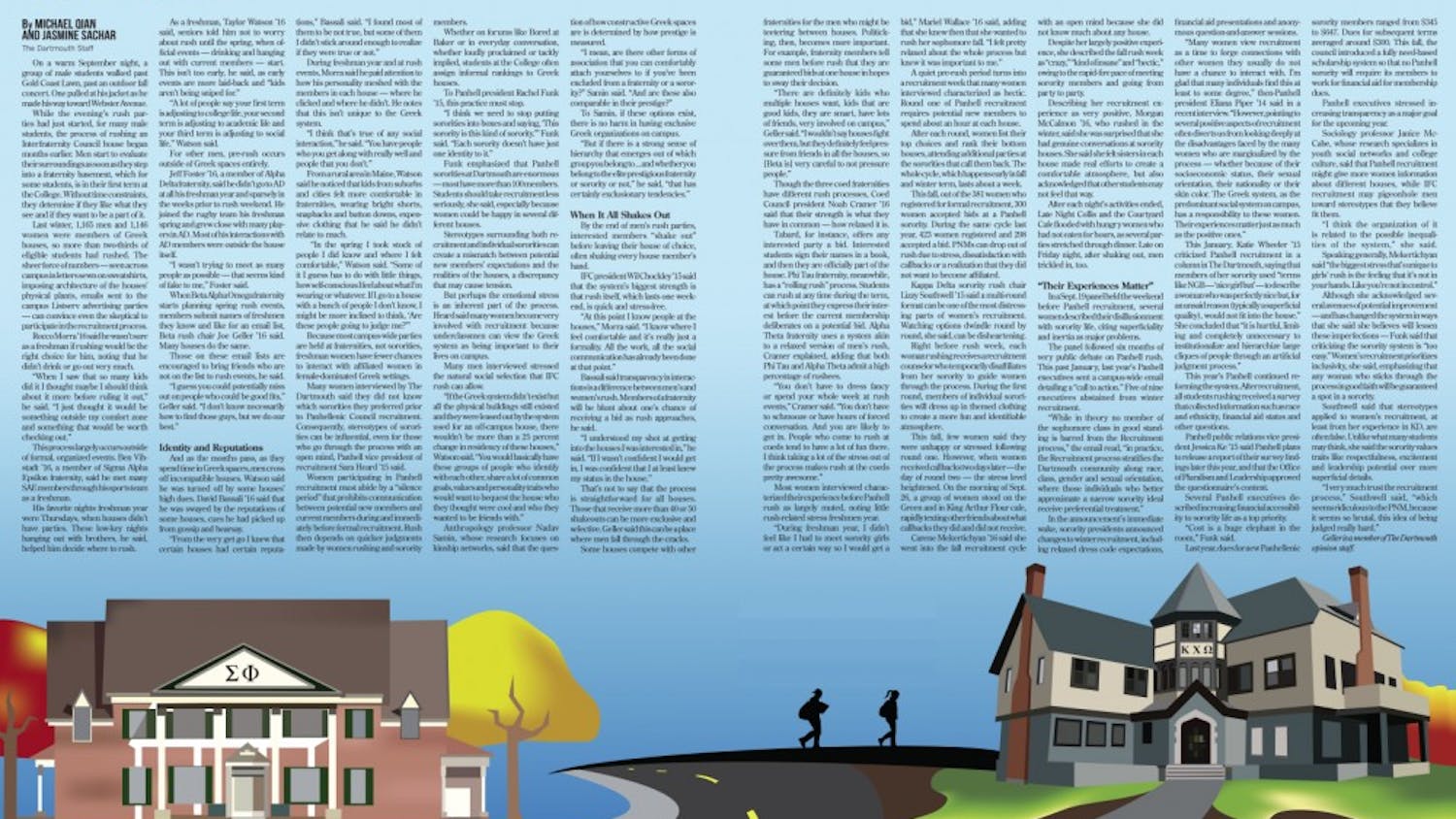Say what you will about us, we have a flair for the irreverent.
It’s my junior year, during one of my fraternity’s now-discontinued pledge terms. The halls are dark, pledges are shuffling from one quasi-voluntary activity to the next, with brothers shuffling along behind. Both groups have been drinking. One brother decides the moment calls for a song and belts out:
“Amazing grace, how sweet the sound / That saved a wretch like me.”
The other wretches in the room join in. If Jesus is watching, He’s probably a little disappointed, but He must be grinning at least a little at the whole scene’s absurdity.
Yes, we do irreverence pretty well. But in my two-and-a-half years of Greek life, I detected a sort of reverent irreverence: for better and for worse, the Dartmouth Greek system is essentially a religion unto itself.
I don’t want to take the analogy too far. But as a sometime student and current practitioner of actual religion, the two aren’t hard to compare. Fraternities hold weekly rituals. They instill pride in long-held traditions with murky histories. They have origin myths. They evangelize and convert.
I was one such convert. I came to Dartmouth a sardonic but awkward still-closeted gay Quiz Bowl nerd — who’d never had a drink outside of Eucharistic contexts — and rushed on a whim my sophomore winter. Even now, I have to explain to bemused cousins, coworkers and dates that yes, I was actually in a frat; yes, I liked it; no, it wasn’t that weird.
Converts are often the biggest zealots, and that’s been true for me at times. In a lot of ways, my Greek experience highlighted the system’s best qualities. It took me a while to get acclimated, but my house gave me a space and community to call my own to a degree I’d rarely experienced. I made what I know will be lifelong friendships. For the first time in my life, I was “one of the guys.”
Like religion, Greek life is at its best when it creates communities, unites people from different backgrounds and provides a welcoming social environment to those who may not have had one before. In my own experience and that of many others, Greek life had a positive, centering impact on our lives, making us more confident, outgoing and able to live with others.
However, as with religion, Greek life is at its worst when it divides instead of unites, fosters insularity and tribalism, becomes defensive and petty, buttresses social pyramids, when it assumes its own ubiquity and vitality and lets stasis and tradition take priority over openness and community. And too often, this is the side we see.
I was never an ultra-orthodox Greek, but even my periods of convert’s zeal have been tempered by these realities. I have seen people excluded from houses for petty, personal grievances. I have seen tears during rush. I have seen promising academic lives take a permanent backseat to pong. I have seen relatively pointless hazing rituals defended as God-given rights. I have seen the system’s mildest critics shouted down, or smirkingly dismissed as “soft.” I have heard wide swaths of unique, vibrant individuals reduced to crude stereotypes and rungs on house rankings.
That’s not even mentioning the ugly, violent byproducts of the liquor-soaked social scene we provide and which most of us have been content to accept without serious question.
And when someone brings all of this up, the Greek system presents its central mystery of faith. Nobody’s serious about this, we say. We’re just a bunch of guys who like to drink beer. But by God, don’t try to change us even a little bit — Dartmouth just couldn’t exist without us.
As with criticisms of my real-life faith, I reject the anti-Greek arguments that rely on stereotype and caricature. We are not all the brain-dead reactionaries, the debauched louts or the privileged white heterosexuals we’re sometimes generalized as being.
What I’ve realized, though, is that it’s not enough to say “we’re not all like that.” For one thing, we’re more like that than we care to admit; for another, we are not excused from responsibility just because we aren’t like that. The Greek system has caused real harm. To deny this does no credit to its positive stories.
As an alumnus, I find myself thinking and caring less about the future of the Greek system. While I cannot and will not separate Greek identity from my Dartmouth identity, I’m not terribly invested in it anymore. But I would ask those who still keep the faith, who still very much care about keeping Greek life alive: what about it do you sincerely want to preserve?
Is it really about the system, or is it about the communities you’ve found there? Is it the rituals by themselves, or how they connect you to other people? Is it the pledge activities, doming or pong marathons you value, or is it really just about having a place to gather with people you’ve come to know as friends and call your siblings? If the system is to exist in any form, we disciples must remember and reassess our priorities.
Don’t let your house define your personality. Keep your old friends. Make new friends, Greek and non-Greek. Don’t dismiss people because they say something you don’t like. Don’t turn a blind eye to people who are hurting. Listen. Enjoy the full richness of this beautiful campus, which can include a fraternity basement, but is absolutely not limited to it.
Because when you leave this place, the frat rankings, the drinking contests, the mere system and all its institutional politics won’t really matter. It’s really about human beings — without that focus, it’s not really a faith worth keeping.
Stephen Kirkpatrick is a former member of The Dartmouth senior staff.


